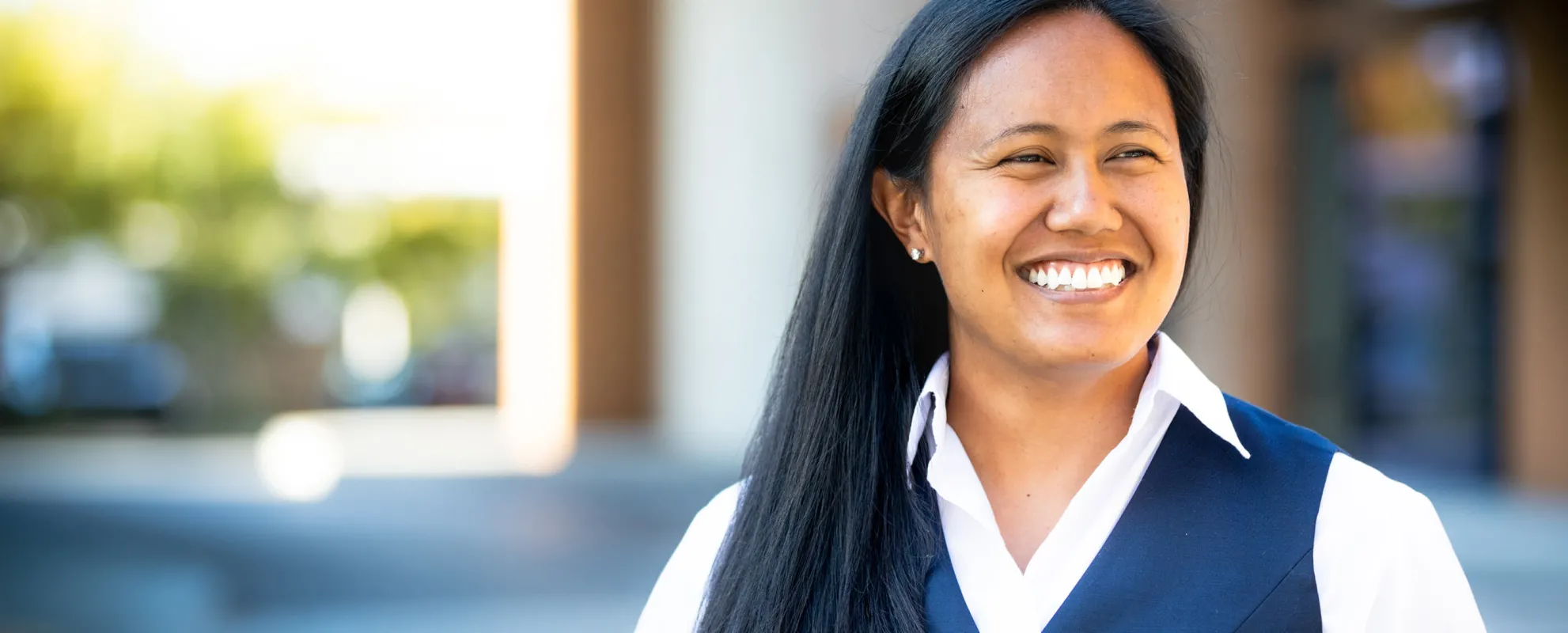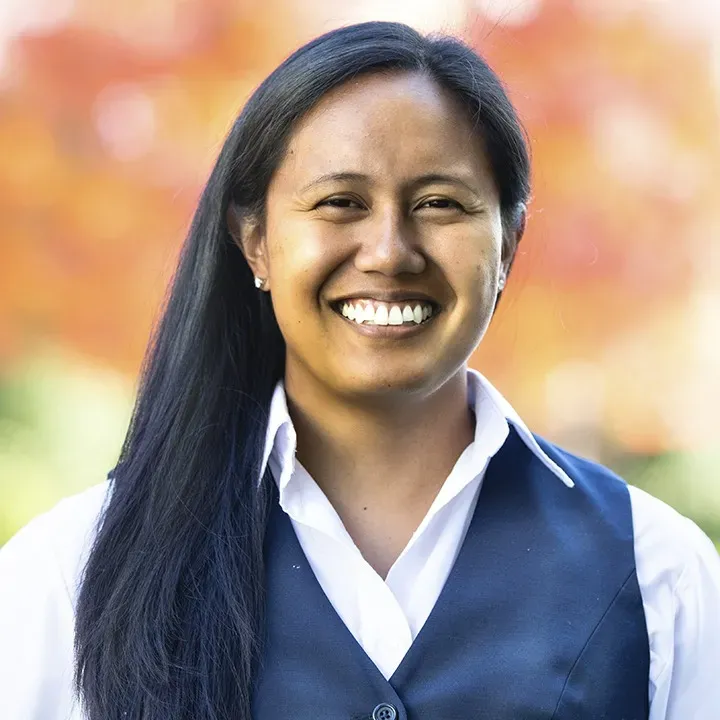Jurelle June Mendoza studied chemical engineering at West Point, nudged toward the hard-sciences by her well-intentioned Philippine immigrant parents. But when she was exposed to a wider world of career possibilities during her undergraduate education, and later in the U.S. Army, she found something missing from her chosen field: passion.
“We’re Asian, and my mom definitely had an idea that the math and sciences were my strong suit and something I could play to my advantage,” says Mendoza, who plans to graduate with her MBA next summer. “And I actually did enjoy it in high school. But at West Point, I realized it probably wasn’t the right choice for me.”
She finished her Bachelor of Science degree, but where she discovered her passion was in what she calls the “signal community” of the U.S. Army, where her knack for technology, communications hardware, and logistics proved much more interesting. She rose to the rank of company commander and logistics officer with the 41st Signal Battalion and remains on active duty, but in 2019 she took advantage of the Army’s willingness to fund her graduate education at Stanford GSB.
After receiving her degree, she intends to return to military life for at least the next six years to help “transform technology in the Army to keep up with the ever-changing environment and improve our ability to connect forces around the globe.” To that end, she accepted an assignment in Alexandria, Virginia, where she will develop, test, and deploy space-based intelligence, surveillance, and reconnaissance sensors. She also hopes to serve as an example to fellow LGBTQ soldiers that success is possible for everyone in today’s Army.
How did your experience as the child of immigrants shape your approach to life?
It makes me appreciate the opportunities I’ve had, especially in the U.S. That’s something my parents taught me since I was young. They didn’t have the opportunities that I had, because they grew up in the Philippines, and taught me not to take things for granted. I’m an only child as well, and they put a lot of their hopes and dreams into me to make sure I was able to do whatever I wanted.
But your career after business school won’t be typical, since you’re obligated to work another six years for the Army.
The MBA is the perfect degree for me to open up opportunities after my military career, or even within the military. I want to see how I can use what I’ve learned to improve the military, where the technology is so far behind the innovation at civilian corporations. I want to find a way to bridge that gap to help the world’s most dominant fighting force maintain a level playing field in terms of technology. I’ll be transitioning into the acquisition corps, and one of the things I’m focusing on is to help decrease the length of the procurement process. Right now it takes several years to create requirements, test and purchase material, and deploy that technology in the field.
Can you give specific examples of that?
In South Korea, some of the hardware I was dealing with, including routers and switchboards, had been there since the 1980s and 1990s. That was the most current equipment we were using. Even some of the newer equipment we got was five to 10 years old. In today’s tech world, that’s such a long time. They’re trying to reduce that to a two-year time span, which is more like the civilian world. That’s where I hope to plug and play and make a difference.
As a company commander in South Korea, you oversaw a relocation program for moving the camp 40 miles from downtown Seoul. Is that how your shift into logistics came about?
In the military you get put into positions that make you do things out of your scope. At that point, the organization I was working for didn’t have a logistician to help with that move. I had been there for about three months, and after gaining the trust of the top leaders and showing how competent I was, they decided to put it on me.
It wasn’t within my scope, but I held the position of logistician during that time. They needed someone they could trust to get it done. I saw it as a good challenge and a chance to learn more about what it takes to move not just people but all of their equipment as well. That was one of the hardest things I had to accomplish in a short amount of time. They gave me the assignment about a month before we had to move. I literally had four weeks to get it done, and that’s what I did.
What did you find most challenging about logistics work?
How to coordinate all of the moving pieces and understand the network there. In the signal world, I knew who the important people were to make things move, but in the logistics world I had no idea who to call. If A, B, and C had to happen in that order, I had to make sure A happens first, and if that’s delayed, how to push back B and C. There was a lot of coordinating pieces with timelines. Understanding that process was most important to my success.
How did your experiences as a member of the LGBTQ community in the Army shape you?
While I was at West Point, the don’t-ask-don’t-tell policy was still in effect. At that point in my life, it was difficult for me because I was at an institution that would potentially kick me out if I did come out. I graduated in May 2011, and they repealed the policy later that fall. I was not out when I entered the military, just because of fear, and it took me two years to come out for the first time. For me it was internal, but there were external issues that made it tough as well.
What do you mean by that?
I had a leader who asked me what Pride Month was. He was not even aware of it. He didn’t specifically say anything, but you could just tell he disagreed with those type of values. It made it very difficult for me as someone working under him to be myself. But luckily I switched into an organization where I felt more comfortable and accepted, and that’s where I was able to come out. Finding leaders who make people comfortable in the workplace means a lot to me.
Is that one of your goals when you go back into military life, to be one of those leaders?
I want to make sure anyone who works with me understands that I accept them for who they are, whether they are LGBT, or Black, or whether they come from low-income families. It’s not based on your background, but more on who you are as a person and what you can do for the military. When I had that sort of leadership, that’s when I had the confidence to come out.
Is that kind of military leadership more common these days?
When I first joined, I saw it as rare because I was in an organization that had a lot of older higher-ranking leaders. But it has definitely changed and leaders are now open to more diverse perspectives. I led with a lot of introductions by saying I was a lesbian, and I would introduce girlfriends and bring them to formal events. Everyone was very welcoming and accommodating. We’re doing a better job with incoming soldiers, but there’s room to improve with the higher levels of leadership. There’s still a divide in how many females — or Asians or Blacks or Latinos or LGBT — are in the top general positions. For me, staying in and being out shows those younger soldiers that there’s room to advance in the military.
You ran two marathons in 2013. Are you still setting those kinds of goals for yourself?
I like to push my limits, whether it’s physically, personally, or professionally. At that time, a friend asked me if I wanted to run a marathon with her. I didn’t like running, but decided I would think of it as a challenge. I trained for it and ran it. What’s funny is that I inspired several of my close friends to run a marathon later that year, so I figured if I can do it once, I can do it twice. So I ran another one with them six months later. That accomplishment put me on top of the world and made me feel I can do anything if put my mind to it.
How important are sports to you?
I work out a lot and play tennis four or five times a week. At one point in college, I thought I would quit the tennis team. It started to feel like an obligation. But over winter break my junior year, I played doubles with some friends at home. It was just recreational and we had so much fun. It reminded me of why I love tennis. That was an epiphany, and I decided to continue to play, but to play for myself. That spring I was undefeated for the regular season 12-0 and was MVP for the conference championship and won the match that brought us to NCAAs. That helped me realize what it means to do things for the right reasons, things that bring you happiness and joy.
Any particular experiences you’ve had at Stanford GSB that have been especially meaningful?
Most recently I was in GEN 520, about the science of the mind, and one of the key things Baba Shiv quoted was: “Busy is the new stupid.” It was from an interview with Warren Buffett and Bill Gates. It helped me realize that we’re so busy filling up our calendars that we don’t give ourselves time to think. I also took Allison Kluger’s class in reputation management, which focuses on self-awareness regarding your reputation but also the importance of understanding how others perceive you. And I really enjoyed the leadership stories in Susan Colby’s class, Diverse Leadership as an Imperative for Impact. We came up with a personal narrative about our leadership style and shared our experiences with the class. It was the best way to show who I am as a person and what I want to get out of this MBA.
Photos by Tricia Seibold


